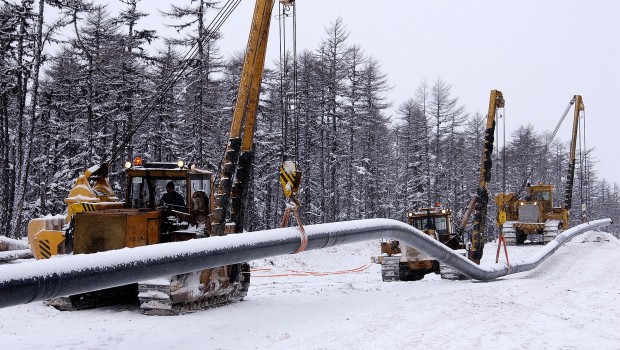Energy Files: Government ‘strategically manages’ relationships with energy giants

Sanctions on Russian energy firms led to a flurry of meetings and emails between executives from UK energy companies with investments in Russia and government officials – according to the latest batch of documents obtained by Unearthed’s freedom of information requests.
The FOIs cover meetings and emails between executives from Shell, BP and British Gas parent company Centrica and secretaries of state, peers, trade envoys, and senior UKTI (UK Trade & Investment) and DECC staff over the course of the spring and summer last year when the Ukraine/Russia crisis was flaring up.
In slightly-less-redacted-than-usual responses to an FOI request, hints were given as to the UKTI’s “strategic relationship management” of UK energy majors and utilities – which includes rather diplomatic (read: ingratiating) instructions of what government officials should say in their meetings with the energy giants.
“Everybody’s talking to Shell”.
The documents came as German utility RWE sells a bunch of North Sea oil and gas fields to Russian investor Mikhail Fridman in a £5.6bn deal – despite UK government opposition. Former BP executive, peer and government advisor Lord Browne is set to lead the new Russian-backed energy investment outfit, L1 energy.
The emails reveal series of meetings between the energy giants and the government’s so-called SRM (presumably Strategic Relationship Management) department between March and September 2014 on the topic of the Ukraine crisis.
The crisis led to a series of sanctions imposed on Russia by the West in March, April, July and September.
Also read:
- Energy Files: Shell was telling ‘everybody’ REDACTED about the Ukraine gas crisis
- Energy Files: Firms told government REDACTED about Ukraine gas crisis
The SRM get-togethers occurred parallel to another series of meetings between the same firms and representatives from DECC, including energy and climate change secretary Ed Davey.
And the firms were also lobbying at a diplomatic level, according to FOI responses from the Foreign Office on the same subject – one noting “Everybody’s talking to Shell”.
Exposure to sanctions
Shell and BP are both highly involved with investments and joint ventures in Russia. Shell has 2,500 staff in Ukraine and 800 in Russia, while BP has around 300 staff in the two countries, the FOI responses reveal.
Most Western oil companies remain keen to exploit oil and gas in Russia, and reports suggest BP it is going full steam ahead despite the sanctions – while Shell is taking a more cautious approach.
Meanwhile, Centrica has a deal with Gazprom to supply 10% of the UK’s residential gas demand from 2014.
In some ways, it seems perfectly natural that UKTI representatives should meet people from the UK’s energy giants. It would more be weird if they didn’t. What matters is the nature of the meetings.
Power dynamics play out
As usual, we can’t really tell, but from what it’s possible to ascertain from one side’s notes, emails and briefings – the stuff that’s not redacted, anyway – energy firms seemed distinctly unfazed by the UK government’s posturing, while ministers tried hard to assuage their egos.
Ahead of his meeting with senior BP execs in September, business secretary Vince Cable was briefed to congratulate Iain Conn on his new role as CEO of Centrica and “express enthusiasm” for working with him and his BP colleagues in the future.
Meanwhile, notes from a separate meeting between BP senior staff and UKTI in March show BP is playing it more coyly.
They say they plan no mitigating actions but it “depends on what sanctions are developed and what the Russian retaliatory response to those will be.” So it’s “Hard to say.”
In another instance, the advisers of Harriet Brown, MP and erstwhile trade envoy for Russia, suggested she should say at a meeting in April how super keen the government is to engage with businesses like Shell that are operating in Ukraine and Russia.
Plus, she should say she’s “very grateful” to Shell for them sparing the time to lobby the government on this issue.
But then because of redactions we don’t know how much of how Shell responded to this. In March they said they planned “no explicit actions being taken to mitigate risks”.
As for Centrica, their strategic relationship point person was Tory peer Lord Deighton, who is commercial secretary to the Treasury.
The dynamic appears a little different here from what we can gather – outspoken outgoing Centrica CEO Sam Laidlaw expressed in April “The Ukrainian situation is a worry”, adding “Gas security of supply is not a given”.
Lord Deighton seems to have been prepped to hold firm when “pressed on the government’s position” by Centrica. It’s not clear what the government won’t intervene in from the lack of context in the briefing and redations. Whatever it is, it’s a “commercial matter” and so the markets should decide, apparently.
Again, perhaps none of this is too surprising. If ministers can’t change a firm’s plans to sell North Sea assets to Russian investors – in the midst of international sanctions and public criticism – it’s unlikely their private meetings would get very far.

